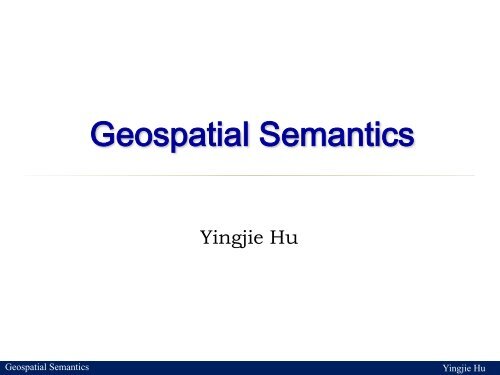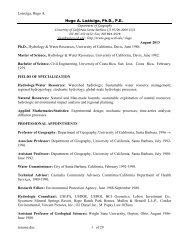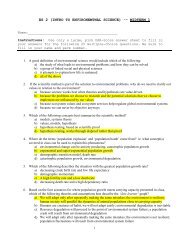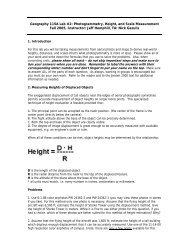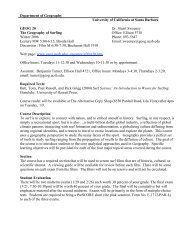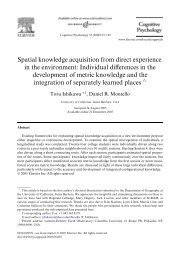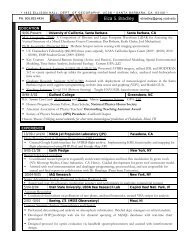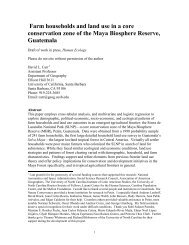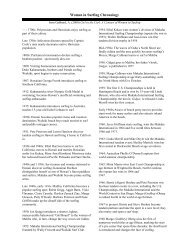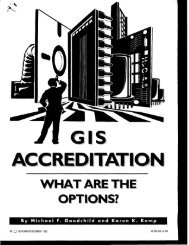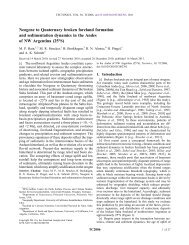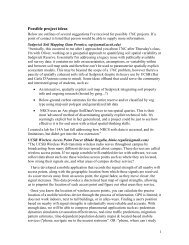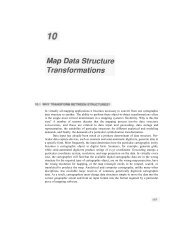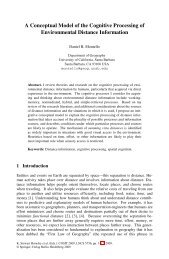Guest lecture: Geospatial Semantics
Guest lecture: Geospatial Semantics
Guest lecture: Geospatial Semantics
You also want an ePaper? Increase the reach of your titles
YUMPU automatically turns print PDFs into web optimized ePapers that Google loves.
<strong>Geospatial</strong> <strong>Semantics</strong><br />
Yingjie Hu<br />
<strong>Geospatial</strong> <strong>Semantics</strong><br />
Yingjie Hu
Outline<br />
• What is geospatial semantics?<br />
• Why do we need it?<br />
• Existing researches.<br />
• Conclusions.<br />
<strong>Geospatial</strong> <strong>Semantics</strong><br />
Yingjie Hu
What is geospatial semantics?<br />
• <strong>Semantics</strong><br />
• The meaning of expressions<br />
• Syntax<br />
• How you express the meaning<br />
• E.g. “I love GIS”<br />
<strong>Geospatial</strong> <strong>Semantics</strong><br />
Yingjie Hu
What is geospatial semantics?<br />
• <strong>Semantics</strong><br />
• The meaning of expressions<br />
• Syntax<br />
• How you express the meaning<br />
• E.g. “I love GIS”<br />
“I ♥ GIS”<br />
<strong>Geospatial</strong> <strong>Semantics</strong><br />
Yingjie Hu
What is geospatial semantics?<br />
• <strong>Semantics</strong><br />
• The meaning of expressions<br />
• Syntax<br />
• How you express the meaning<br />
• E.g. “I love GIS”<br />
“I ♥ GIS”<br />
Different syntaxes<br />
Same meaning<br />
<strong>Geospatial</strong> <strong>Semantics</strong><br />
Yingjie Hu
What is geospatial semantics?<br />
• <strong>Geospatial</strong> semantics<br />
• The meaning of geospatial data<br />
• Thematic information, Data source, coordinate<br />
systems, data collection time…<br />
• The meaning of geospatial functions<br />
• The meaning of the input data, the capability of this<br />
function, the meaning of the output data …<br />
<strong>Geospatial</strong> <strong>Semantics</strong><br />
Yingjie Hu
Why do we need geospatial<br />
semantics?<br />
• Making computers understand the<br />
meaning of geospatial data and functions.<br />
• Computers cannot truly understand the<br />
meaning of data and functions.<br />
• E.g. Contours– treated as polylines<br />
• Systems are like “parrots” mimicking<br />
language without understanding it.<br />
<strong>Geospatial</strong> <strong>Semantics</strong><br />
Yingjie Hu
Why do we need geospatial<br />
semantics?<br />
“I like GIS” (human language)<br />
What did I say???<br />
<strong>Geospatial</strong> <strong>Semantics</strong><br />
Yingjie Hu
Why do we need geospatial<br />
semantics?<br />
• Why do we need to make computers<br />
understand the geospatial data and<br />
functions, since our humans can do that?<br />
<strong>Geospatial</strong> <strong>Semantics</strong><br />
Yingjie Hu
Why do we need geospatial<br />
semantics?<br />
• The reason lies in the distributed geospatial<br />
data and functions.<br />
<strong>Geospatial</strong> <strong>Semantics</strong><br />
Yingjie Hu
Why do we need geospatial<br />
semantics?<br />
• Previously, geospatial data and functions<br />
resided locally (which can be easily<br />
understood by local community members)<br />
• Today, they are distributed at different<br />
places throughout the world (which<br />
requires much interpretation work)<br />
<strong>Geospatial</strong> <strong>Semantics</strong><br />
Yingjie Hu
Why do we need geospatial<br />
semantics?<br />
• How can we make computers autonomously<br />
retrieve the right geospatial data and<br />
functions without human intervention?<br />
<strong>Geospatial</strong> <strong>Semantics</strong><br />
Yingjie Hu
Why do we need geospatial<br />
• Several approaches<br />
semantics?<br />
• Syntactically define geospatial services<br />
• E.g. Web service description language (WSDL)<br />
defines the type of the input and output data<br />
• Does not semantically define the services<br />
• Services with different meanings may be falsely<br />
combined together. (temperature and wind<br />
direction)<br />
<strong>Geospatial</strong> <strong>Semantics</strong><br />
Yingjie Hu
Why do we need geospatial<br />
semantics?<br />
• Several approaches<br />
• Metadata (Data’s data)<br />
• Synonymy (Different words same meaning)<br />
• UC Santa Barbara and UCSB<br />
• Zip code and postal code<br />
• Polysemy (Same word has different meanings)<br />
• Address (location or speech?)<br />
• Wood (a piece of tree or an area covered with trees?)<br />
<strong>Geospatial</strong> <strong>Semantics</strong><br />
Yingjie Hu
How can we make computers understand the<br />
meaning of geospatial data and functions<br />
since it is so complicated?<br />
<strong>Geospatial</strong> <strong>Semantics</strong><br />
Yingjie Hu
Existing work on geospatial<br />
semantics<br />
???<br />
Web service A<br />
Name: Bank<br />
Description: The number<br />
of banks in this area<br />
Output: Integer<br />
I want to find the<br />
service about “bank”,<br />
but which one…<br />
Web service B<br />
Name: Riverside<br />
Description:<br />
The number of riversides<br />
in this area<br />
Output: Integer<br />
<strong>Geospatial</strong> <strong>Semantics</strong><br />
Yingjie Hu
Existing work on geospatial<br />
• What can we do?<br />
semantics<br />
• Writing an algorithm to make computers<br />
understand the literal meaning of the word?<br />
<strong>Geospatial</strong> <strong>Semantics</strong><br />
Yingjie Hu
Existing work on geospatial<br />
• What can we do?<br />
semantics<br />
• Writing an algorithm to make computer<br />
understand the literal meaning of the word?<br />
• But only given the word “bank”, even humans<br />
cannot understand its exact meaning.<br />
<strong>Geospatial</strong> <strong>Semantics</strong><br />
Yingjie Hu
Existing work on geospatial<br />
• What can we do?<br />
semantics<br />
• Writing an algorithm to make computer<br />
understand the literal meaning of the word?<br />
• But only given the word “bank”, even humans<br />
cannot understand its exact meaning.<br />
• Using more detailed metadata to describe the<br />
function of the two services?<br />
<strong>Geospatial</strong> <strong>Semantics</strong><br />
Yingjie Hu
Existing work on geospatial<br />
• What can we do?<br />
semantics<br />
• Writing an algorithm to make computer<br />
understand the literal meaning of the word?<br />
• But only given the word “bank”, even humans<br />
cannot understand its exact meaning.<br />
• Using more detailed metadata to describe the<br />
function of the two services?<br />
• But different service providers will describe the<br />
services in different ways. How can we suppose a<br />
computer to understand these various descriptions?<br />
<strong>Geospatial</strong> <strong>Semantics</strong><br />
Yingjie Hu
Existing work on geospatial<br />
semantics<br />
• Experience of dealing with geographic<br />
information gives us the inspiration to<br />
solve this problem.<br />
• A piece of geographic information can be<br />
decomposed as three parts: spatial,<br />
temporal and thematic data.<br />
<strong>Geospatial</strong> <strong>Semantics</strong><br />
Yingjie Hu
Existing work on geospatial<br />
semantics<br />
• Spatial data (Where)<br />
Spatial reference system<br />
(X, Y)<br />
<strong>Geospatial</strong> <strong>Semantics</strong><br />
Yingjie Hu
Existing work on geospatial<br />
semantics<br />
• Temporal Data (When)<br />
Temporal reference system<br />
(Calendar)<br />
Jan. 12th, 2012<br />
<strong>Geospatial</strong> <strong>Semantics</strong><br />
Yingjie Hu
Existing work on geospatial<br />
semantics<br />
• Thematic Data (What)<br />
Would it be nice if we also have a<br />
semantic reference system ?<br />
“Bank”<br />
<strong>Geospatial</strong> <strong>Semantics</strong><br />
Yingjie Hu
Existing work on geospatial<br />
• Impossible?<br />
semantics<br />
• Imagine the world before spatial reference<br />
systems and calendars, accurately expressing<br />
spatial and temporal information would be as<br />
difficult as describing thematic data.<br />
<strong>Geospatial</strong> <strong>Semantics</strong><br />
Yingjie Hu
Existing work on geospatial<br />
semantics<br />
• How to establish semantic reference<br />
systems?<br />
<strong>Geospatial</strong> <strong>Semantics</strong><br />
Yingjie Hu
Existing work on geospatial<br />
semantics<br />
• How to establish semantic reference<br />
systems?<br />
Ontologies<br />
<strong>Geospatial</strong> <strong>Semantics</strong><br />
Yingjie Hu
Existing work on geospatial<br />
• Ontologies<br />
semantics<br />
• Originally come from philosophy.<br />
• Now used in computer and information science.<br />
• Specify the meaning of the terms used in a<br />
domain and the relations among these terms.<br />
• Common components in an ontology<br />
• Classes: concepts about things e.g. “car”, “table”<br />
• Properties: relations connecting classes e.g. “is a”, “has”<br />
• Individuals: specific objects e.g. “this car”, “that table”<br />
<strong>Geospatial</strong> <strong>Semantics</strong><br />
Yingjie Hu
Existing work on geospatial<br />
semantics<br />
• In ontologies, we can have<br />
Bank<br />
Is one side of<br />
River<br />
Bank<br />
Deals with<br />
Money<br />
<strong>Geospatial</strong> <strong>Semantics</strong><br />
Yingjie Hu
Existing work on geospatial<br />
• Problem solved?<br />
semantics<br />
• Our solution is based on the assumption that<br />
people also agree on using the classes of<br />
“river” and “money” and the properties of “is<br />
one side of” and “deals with”.<br />
<strong>Geospatial</strong> <strong>Semantics</strong><br />
Yingjie Hu
Existing work on geospatial<br />
• Problem solved?<br />
semantics<br />
• Our solution is based on the assumption that<br />
people also agree on using the classes of<br />
“river” and “money” and the properties of “is<br />
one side of” and “deals with”.<br />
• What if some people use “stream” instead of<br />
“river” in their ontologies?<br />
<strong>Geospatial</strong> <strong>Semantics</strong><br />
Yingjie Hu
Existing work on geospatial<br />
• Problem solved?<br />
semantics<br />
• Our solution is based on the assumption that<br />
people also agree on using the classes of<br />
“river” and “money” and the properties of “is<br />
one side of” and “deals with”.<br />
• What if some people use “stream” instead of<br />
“river” in their ontologies?<br />
• Then do we have to create ontologies to<br />
define every word in our world? That may be<br />
even more difficult than creating a new<br />
language.<br />
<strong>Geospatial</strong> <strong>Semantics</strong><br />
Yingjie Hu
Existing work on geospatial<br />
semantics<br />
• Foundation ontology (upper ontology)<br />
• An ontology which describes general terms across<br />
domains and which is agreed and shared by a<br />
large community.<br />
• Classes and properties are considered as primitive<br />
elements.<br />
• Domain ontologies<br />
• Ontologies for a specific domain.<br />
• Concepts are constructed based on primitive<br />
elements.<br />
• Shared by people in particular fields.<br />
<strong>Geospatial</strong> <strong>Semantics</strong><br />
Yingjie Hu
Existing work on geospatial<br />
semantics<br />
<strong>Geospatial</strong> <strong>Semantics</strong><br />
Yingjie Hu
Existing work on geospatial<br />
semantics<br />
Foundation ontology<br />
Domain ontology<br />
Person<br />
School<br />
Is a<br />
Studies in<br />
Person<br />
Is a<br />
Student<br />
Studies in<br />
School<br />
<strong>Geospatial</strong> <strong>Semantics</strong><br />
Yingjie Hu
Existing work on geospatial<br />
semantics<br />
• Different domain ontologies can be<br />
transformed to one another since they are<br />
all constructed based on the foundation<br />
ontology.<br />
• Just like one spatial reference systems<br />
can be transformed to another based on<br />
mathematical methods.<br />
<strong>Geospatial</strong> <strong>Semantics</strong><br />
Yingjie Hu
Existing work on geospatial<br />
• Problems remain<br />
semantics<br />
• Is it possible to create a foundation ontology<br />
agreed by most people?<br />
• The number of primitive elements is not infinite. It<br />
is estimated that there may be 2,000 to 10,000<br />
classes and properties in the foundation ontology.<br />
• It does not have to be agreed by everyone in this<br />
world. Developers will use it to make profits if there<br />
is a shared agreement in a large enough<br />
community.<br />
• Existing foundation ontologies: Descriptive<br />
Ontology for Linguistic and Cognitive Engineering<br />
(DOLCE), Basic Formal Ontology (BFO)…<br />
<strong>Geospatial</strong> <strong>Semantics</strong><br />
Yingjie Hu
Conclusions<br />
• <strong>Geospatial</strong> semantics means the meaning<br />
of geospatial data and functions.<br />
• <strong>Geospatial</strong> semantics can help computers<br />
find the right data and functions without<br />
human intervention.<br />
• Ontologies can be used to construct<br />
semantic reference systems that can<br />
clarify the meaning of data and functions.<br />
<strong>Geospatial</strong> <strong>Semantics</strong><br />
Yingjie Hu
Reference<br />
• Kuhn, W. (2005). <strong>Geospatial</strong> <strong>Semantics</strong>: Why, of What,<br />
and How? Journal on Data <strong>Semantics</strong> III, LNCS, 3534, 1<br />
– 24.<br />
• Kuhn, W., (2003). Semantic Reference Systems.<br />
International Journal of Geographical Information<br />
Science, <strong>Guest</strong> Editorial, 17(5), pp. 405-409<br />
• Janowicz, K. and Scheider, S. (2010): Semantic<br />
Reference Systems. In: Encyclopedia of Geography. B.<br />
Warf (Ed.). SAGE Publications.<br />
• Frank (2003), Ontology for Spatio-temporal Databases,<br />
Lecture Notes in Computer Science, 2003, Volume<br />
2520/2003, 9-77.<br />
<strong>Geospatial</strong> <strong>Semantics</strong><br />
Yingjie Hu


